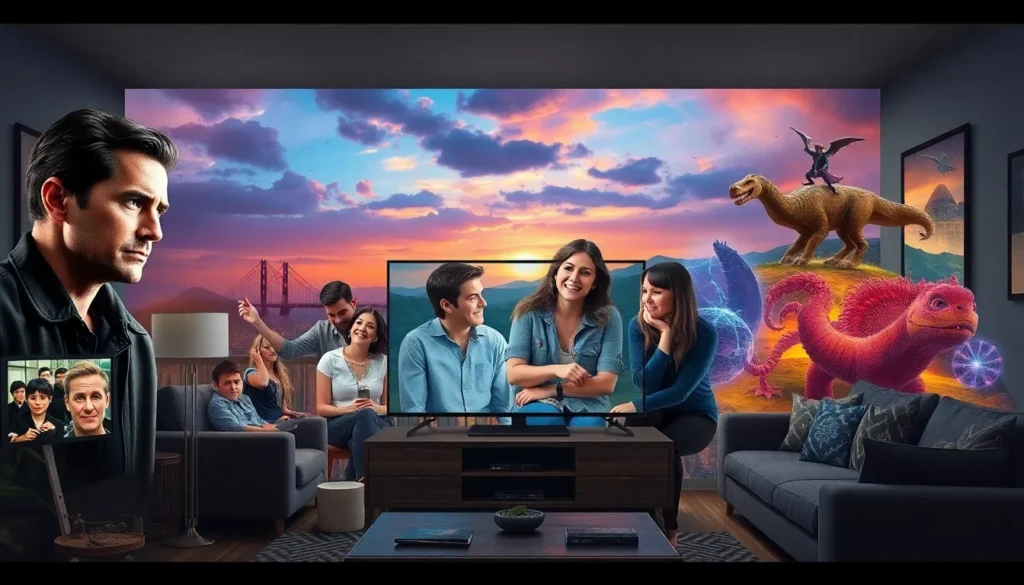Table of Contents
ToggleTV shows have become an integral part of modern entertainment, captivating audiences across the globe. From gripping dramas to laugh-out-loud comedies, they offer a diverse range of stories that resonate with viewers from all walks of life. As streaming platforms continue to rise, the landscape of television is evolving, giving rise to new genres and innovative storytelling techniques.
With binge-worthy series and episodic gems, TV shows not only entertain but also spark conversations and create communities. Whether it’s the latest blockbuster hit or a hidden gem, there’s always something new to discover. Dive into the world of television and explore the shows that are shaping culture and influencing trends today.
Overview of Popular TV Shows
TV shows engage global audiences with captivating narratives and diverse genres. Popular genres include:
- Drama: Critical hits like Breaking Bad and The Crown explore complex characters and moral dilemmas.
- Comedy: Series such as The Office and Parks and Recreation deliver humor through relatable scenarios and strong ensemble casts.
- Science Fiction: Shows like Stranger Things and The Expanse blend imaginative concepts with social commentary, attracting dedicated fanbases.
- Fantasy: Game of Thrones and The Witcher immerse viewers in richly developed worlds with intricate storylines and character arcs.
- Thriller: Programs like Mindhunter and True Detective build suspense with psychological depth and gripping narratives.
Streaming platforms such as Netflix and Amazon Prime Video influence viewing habits, allowing for binge-watching and on-demand access. This shift encourages audiences to discover niche series alongside mainstream hits.
Community engagement increases as viewers discuss theories and share opinions online. This interaction enhances the experience of following serialized storytelling, creating cultural touchpoints that resonate across demographics.
The evolution of TV shows continues, with innovative formats such as limited series bringing fresh storytelling techniques to traditional structures. Bold experimentation in content drives the creation of unique series, fostering a rich landscape of entertainment choices.
Genre Breakdown

TV shows encompass a wide variety of genres, each offering unique storytelling experiences. Understanding genre classifications helps viewers choose what to watch based on their preferences.
Drama Series
Drama series prioritize emotional depth and character development. These shows often tackle complex themes and relationships. Notable examples include:
- Breaking Bad – A high school chemistry teacher turns to cooking methamphetamine after a terminal diagnosis.
- This Is Us – A family saga exploring the nuances of love, loss, and the intertwining lives of family members.
These series often keep audiences engaged with cliffhangers and character arcs.
Comedy Series
Comedy series aim to entertain through humor and wit. These shows frequently reflect societal issues in a light-hearted manner. Popular examples include:
- The Office – A mockumentary-style series showcasing the everyday lives of office employees at Dunder Mifflin.
- Parks and Recreation – A quirky comedy following the employees of the Parks Department in the fictional town of Pawnee, Indiana.
Comedies enhance viewer enjoyment and foster social conversations.
Reality Television
Reality television presents unscripted content that captures real-life situations, often blurring the lines between entertainment and authenticity. Key examples include:
- Survivor – A competition where contestants navigate physical and social challenges to win a cash prize.
- The Bachelor – Follows a single man as he dates multiple women in hopes of finding love.
Reality shows engage audiences by showcasing relatable experiences and human drama.
The Impact of TV Shows on Culture
TV shows play a crucial role in shaping cultural norms and values. They often reflect current societal issues, influencing viewers’ perceptions and behaviors.
Influencing Trends
TV shows significantly influence fashion, language, and lifestyle trends. Characters often set benchmarks for how audiences perceive acceptable attire, speech patterns, and social interactions. For example, shows like Sex and the City popularized specific fashion brands and styles, affecting consumer behavior and fashion industry trends. Similarly, the use of catchphrases from series such as Friends and How I Met Your Mother permeates everyday conversations, showcasing the show’s power to shape language.
Raising Awareness on Social Issues
TV shows also raise awareness of pressing social issues, prompting discussions among viewers. Series like Orange Is the New Black and 13 Reasons Why spotlight issues such as criminal justice reform and mental health, respectively. By addressing such topics, these shows encourage audiences to engage in critical conversations and understand diverse perspectives. This engagement can lead to increased advocacy and support for real-world causes, demonstrating the potential of television as a platform for social change.
Streaming Platforms and Their Role
Streaming platforms play a pivotal role in the consumption and distribution of TV shows. These services not only provide on-demand access but also reshape viewing habits and influence genre popularity.
Major Players in the Market
Several key players dominate the streaming landscape, transforming how audiences engage with TV shows.
- Netflix: Launched in 1997, Netflix pioneered the subscription-based streaming model. Its vast library includes original series like Stranger Things and The Crown, promoting binge-watching habits.
- Amazon Prime Video: As part of Amazon’s membership, Prime Video offers a robust collection of shows and movies, with highlights such as The Boys and The Marvelous Mrs. Maisel, catering to diverse tastes.
- Hulu: Known for its next-day streaming of network TV shows, Hulu features an impressive blend of original content and current episodes, appealing to viewers seeking timely access.
- Disney+: Focused on family-oriented content, Disney+ includes franchises like Star Wars and Marvel, attracting a broad audience base with its nostalgic and blockbuster offerings.
- HBO Max: Combining HBO’s acclaimed shows with a wealth of other content, HBO Max features top-rated series like Game of Thrones and Succession, establishing itself as a premium choice for serious viewers.
Viewing Habits of Audiences
Audience viewing habits have evolved significantly due to the accessibility and convenience of streaming platforms.
- Binge-Watching: Many viewers engage in binge-watching, consuming entire seasons in one sitting. This trend supports deeper engagement with characters and plots.
- On-Demand Access: Audiences prefer watching shows on their schedules, leading to a decline in traditional cable subscriptions. Flexibility allows viewers to explore niche interests without time constraints.
- Social Viewing: Online communities foster dialogue about shows, encouraging viewers to share opinions and theories. Platforms like Reddit and Twitter enhance the collective viewing experience and build excitement.
- Diverse Preferences: The variety of available genres attracts multiple demographics. Viewers can easily switch between dramas, comedies, and reality shows, ensuring a tailored entertainment experience.
These shifts in viewing habits highlight the significant impact of streaming platforms, reshaping how audiences interact with TV shows and the broader cultural landscape.
TV shows continue to shape modern culture and entertainment in profound ways. Their diverse genres and innovative storytelling captivate audiences and spark conversations that extend beyond the screen.
Streaming platforms have revolutionized how viewers consume content, making it easier than ever to explore both popular and niche series. This evolution has fostered a vibrant community where fans engage with one another, sharing theories and opinions that enhance their viewing experience.
As TV shows reflect societal issues and influence trends, they remain a powerful medium for storytelling. The ongoing transformation of television promises to keep audiences engaged and connected in ways that resonate deeply with their lives.







